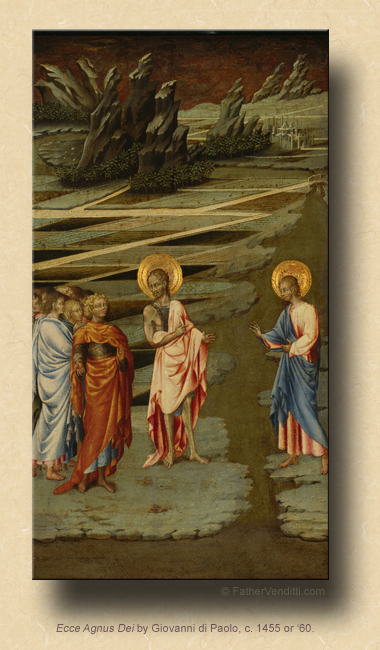How to Listen to God.
The Second Sunday of Ordinary Time.*
Lessons from the secondary dominica, according to the ordinary form of the Roman Rite:
• I Samuel 3-10, 19.
• Psalm 40: 2, 4, 7-10.
• I Corinthians 6: 13-15, 17-20.
• John 1: 35-42.
The Second Sunday after Epiphany.
Lessons from the dominica, according to the extraordinary form of the Roman Rite:
• Romans 12: 6-16.
• Psalm 106: 20-21.
• John 2: 1-11.**
FatherVenditti.com
|
 8:02 AM 1/14/2018 — I’m sure I don’t have to tell you that the interior life of the Christian is a journey across a rough terrain of peaks and valleys. Progress in Christian living is never linear: it’s never a constant progression toward improvement; with every step forward there’s a stumble or two backward. Sometimes we move along our earthy journey to God with ease, and sometimes we find ourselves barely able to tread water spiritually or even morally. This is a feature of our fallen nature. It doesn’t mean that we don’t love God as we should, it means only that we’re human. 8:02 AM 1/14/2018 — I’m sure I don’t have to tell you that the interior life of the Christian is a journey across a rough terrain of peaks and valleys. Progress in Christian living is never linear: it’s never a constant progression toward improvement; with every step forward there’s a stumble or two backward. Sometimes we move along our earthy journey to God with ease, and sometimes we find ourselves barely able to tread water spiritually or even morally. This is a feature of our fallen nature. It doesn’t mean that we don’t love God as we should, it means only that we’re human.
You’d think that the challenging time would be when we’re in one of the valleys of life, struggling with temptation, falling into sin, doubting our faith, or whatever; but, the reality is that the high points in our spiritual journey are often just as challenging. One of the most frequently heard complaints in confession is from souls walking along the peak, not as much struggling with the basics of Christian living, but trying their best to follow our Lord more perfectly. “Father,” they will often say, “I just can’t figure out what God wants me to do.”
Listening to God is a challenge for even the most advanced of souls, and we’ve talked about this before. Remember the example of the Prophet Elijah I’ve pointed out to you so many times: he’s wandering around waiting for God to show him some kind of sign, but God was right there next to him all along, speaking to him “in the whisper of a gentle breeze” (I Kings 19: 12 Knox). He just hadn’t purged from his life the distractions of the world enough to be able to hear it.
All this first week the Old Testament lessons have been from the First Book of Samuel. Today’s lesson is a flash back to the beginning of the whole story, when God first spoke to him. God calls to him, but Samuel is unable to discern the voice of God, the lesson telling us outright that “Samuel was not familiar with the Lord,” or, as Msgr. Knox translates it, “Till then, Samuel was a stranger to the divine voice…” (I Sam. 3: 7 Knox). And doesn’t that describe so many of us? We want to follow our Lord more perfectly, we want to hear his voice speaking to us, we want to know what it is he calls us to do; but, we don’t hear him because we are strangers to the Divine Voice. We don’t hear Him, not because He isn’t speaking to us, but because our ears aren’t attuned to hearing the subtleties that God whispers to us.
Speaking of subtlety, there’s a striking lack of it in the way the Roman Missal has translated today’s psalm: “I have waited, waited for the Lord, and he stooped toward me and heard my cry.” An accurate translation of the Hebrew words, to be sure, but Msgr. Knox, working from both the Greek and the Hebrew, gleans the true sense of what the verse is saying: “Patiently I waited for the Lord’s help, and at last he turned his look towards me…” (Psalm 40: 2 Knox).  Now, look at what the Blessed Evangelist John reports to us in our Gospel lesson: the Baptist sees Jesus walk by and says, “Behold, the Lamb of God.” God only knows what Andrew, Simon’s brother, and John, the brother of James and son of Zebedee, thought that meant; but, whatever they thought it meant, it made them curious enough to follow our Lord. And then, what happens? “Jesus turned and saw them…” (John 1: 38 RM3). There’s no doubt the Evangelist had the text of Psalm 40 in front of him as he recorded this event: “Patiently I waited for the Lord’s help, and at last he turned his look towards me…”; στραφεὶς, the aorist participle passive of the Greek verb στρέφω, but passive only in the reflective sense: not a turning away, nor even just a simple turn without implication, but a deliberate turning toward something or someone. Now, look at what the Blessed Evangelist John reports to us in our Gospel lesson: the Baptist sees Jesus walk by and says, “Behold, the Lamb of God.” God only knows what Andrew, Simon’s brother, and John, the brother of James and son of Zebedee, thought that meant; but, whatever they thought it meant, it made them curious enough to follow our Lord. And then, what happens? “Jesus turned and saw them…” (John 1: 38 RM3). There’s no doubt the Evangelist had the text of Psalm 40 in front of him as he recorded this event: “Patiently I waited for the Lord’s help, and at last he turned his look towards me…”; στραφεὶς, the aorist participle passive of the Greek verb στρέφω, but passive only in the reflective sense: not a turning away, nor even just a simple turn without implication, but a deliberate turning toward something or someone.
But look at the subtlety of it. “Turning, and seeing them follow him, Jesus asked, What would you have of me? Rabbi, they said (a word which means Master), where dost thou live? He said to them, Come and see; so they went and saw where he lived, and they stayed with him all the rest of the day…” (vs. 38-39 Knox).
What they talked about “all the rest of the day” we’ll never know, or even if they talked at all. What we do know is that, after that day spent with our Lord, Andrew went and told his brother, Simon, about it, and introduced him to Jesus, Who gives him a new name, anticipating what role Peter would play in the years to come. John would eventually do the same for his brother, James, so that when our Lord passed by their father’s boat, they would abandon everything to become His disciples. The point is, it all happens gradually and subtly, nothing explicit, nothing direct. With deliberate intent, our Lord calls His disciples with hardly a word spoken other than the simple phrase, “Come and see.” After all, these men know nothing of our Blessed Lord. They’re not going to run off after Jesus without first being formed, and during that process of formation they will no doubt have more questions than answers. God speaks to us only according to our ability to hear and understand Him, and that doesn’t happen overnight, nor does it happen simply because we want it to. It happens because, over a long period of time spent in the quiet of our souls, we have eventually learned to hear the whisper of the gentle breeze that was there all along, but for which we had not yet learned to listen.
Patiently I waited for the Lord’s help, and at last he turned his look towards me; he listened to my plea, drew me up out of a deadly pit, where the mire had settled deep, and gave me a foothold on the rock, with firm ground to tread. He has framed a new music on my lips, a song of praise to our God, to fill all that stand by with reverence, and with trust in the Lord (Psalm 40: 2-4 Knox).
 Patience … silence … quietness of spirit. Prayer is not a constant begging of God for things we think we need; prayer is allowing ourselves to be enveloped in the presence of God, our lives guided by the Church founded on the Rock of Blessed Peter, which assures us that our feet are given firm ground on which to tread. Patience … silence … quietness of spirit. Prayer is not a constant begging of God for things we think we need; prayer is allowing ourselves to be enveloped in the presence of God, our lives guided by the Church founded on the Rock of Blessed Peter, which assures us that our feet are given firm ground on which to tread.
You may have noticed, on those Sundays when I choose to sing the Canon of the Mass, when we get to the memorial acclamation—in Greek it’s called the ἀνάμνησις, meaning "reminiscence" or "memorial” … I should charge you for the Greek lesson you’re getting today—I have to pull out my hearing aid and cover my ears because the singing of the choir makes it difficult to resume the singing of the musical notation as printed in the Missal. That’s a good analogy for what we all have to do in order for us to hear what God may be trying to say to us, and those of you who may also be hearing impaired know what I mean: it isn’t easier to understand people when they shout at you; it’s easier to understand them when they talk in a normal voice, slowly, distinctly, and without accent or excitement. Sometimes someone will come into my confessional and fail to close the door all the way, leaving it open a crack, and I have to tell them to close it all the way. That door isn’t there simply so that no one can hear his or her confession; it’s there because even the faintest of sounds drifting in from the chapel makes it impossible for me to distinguish words even if they’re spoken right into my ear. I can hear the sounds, but my ears can’t understand the words unless they come to me through the absolute blackness of silence.
That’s how we have to listen to God: in silence, without distraction, without background noise. And when we can listen in that way—with a soul tempered by calm and quiet—then we can pray along with Samuel: “Speak, Lord, for your servant is listening.”

* In the ordinary form, the Feast of Baptism of the Lord is the first Sunday of Ordinary Time; however, where the Epiphany is transfered to the Sunday following the Octave of the Nativity and the Baptism is transfered to Monday, than the Epiphany assumes that role. In either case, Ordinary Time begins at that point; thus, today is the Second Sunday of Ordinary Time, even though there was no First Sunday properly so called.
** This Gospel lesson is the Wedding Feast at Cana, the last of the three events commemorated by the Epiphany in the extraordinary form. See the last footnote in the post here for more information.
|

